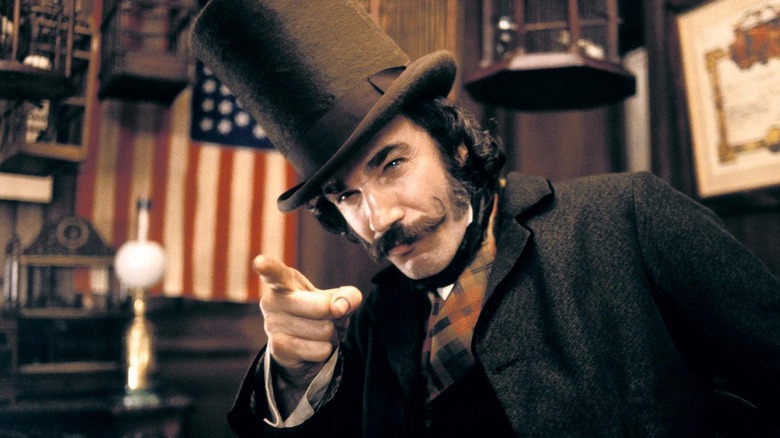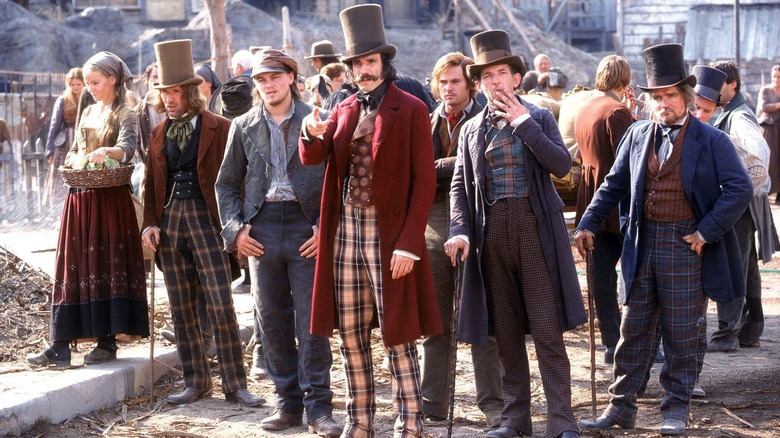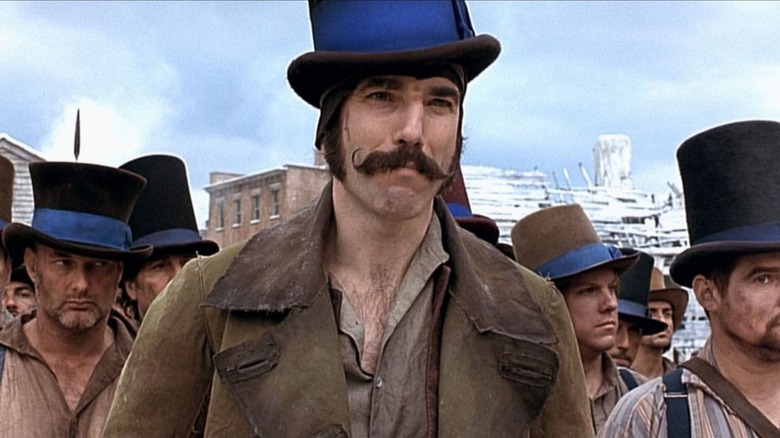Going Method For Gangs Of New York Made Daniel Day-Lewis Sick
Russian actor Konstantin Stanislavski laid out the rules for a revolutionary new system of acting in his 1936 book "An Actor Prepares." In this new system, actors were meant to cultivate what he called an "art of experiencing" as opposed to an "art of representation." This means that actors were meant to find a place wherein they could actually experience the emotions that their character would be experiencing — usually by drawing on a similar event in their own lives. This stood counter to older schools of acting that depended on rote memorization and communicating certain kinds of established physical emotional signifiers. It's the difference between merely smiling and actually feeling happiness.
As such, Stanislavski promoted improvisation as a preferred mode of rehearsal as opposed to table reads and running lines. An actor was encouraged to, essentially, become their character, to experience the role, to live as their character, to remain in-character even when the scene had ended.
Stanislaski's system was adopted by prominent Russian Eastern European acting coaches Richard Boleslawski and Maria Ouspenskaya (from "The Wolf Man"), who taught it to Americans like Lee Strasberg, Stella Adler, and Sanford Meisner, who, in turn, passed the Method on to prominent Hollywood stars like Marlon Brando, Robert De Niro, and Warren Beatty. Since then, the Method has become part and parcel with the craft of acting. While some actors do not subscribe to the Method to the letter, many have still internalized its lessons as a form of vocational osmosis. Other actors, meanwhile, still read "An Actor Prepares" and devote themselves to a role whole-heartedly.
Irish actor Daniel Day-Lewis subscribes to the Method. He stays in character when off set, will continue to speak in his character's dialect when the cameras aren't rolling (Day-Lewis' "Lincoln" co-star Sally Field revealed that he would send her text messages as Abraham Lincoln), and will even stay in costume when possible. This last detail once made Day-Lewis incredibly sick on the set of "Gangs of New York."
Gangs of New York
Martin Scorsese's "Gangs of New York," based on the 1927 book "The Gangs of New York: An Informal History of the Underworld," was a passion project that the filmmaker first obtained the rights to make into a film back in the late 1970s. "Gangs of New York" is set in New York City in 1862, and follows the era's colorful and formally organized street gangs as they battle to control the city's resources and politics. The conflicts would lead to outright wars in the streets, wherein hundreds of gang members would convene to murder each other by the score. Because Scorsese wanted to accurately represent 1862 New York, and because no modern cities looked appropriate, he required that an entire city be built from the ground up. The ambition of "Gangs of New York" is evident in its visuals; Scorsese was clearly adding more and more detail as the extended production dragged on. "Gangs of New York" looks like it had been in production for decades. It was nominated for 10 Academy Awards, and won none, losing Best Picture to "Chicago."
In "Gangs of New York," Daniel Day-Lewis plays a character named William "Bill the Butcher" Cutting, who is extrapolated from the real-life gang leader William Poole. Poole was a vicious nativist and leader of the notorious Know Nothing party in the United States, which opposed immigration, preached racist rhetoric, and embraced xenophobia as a way of life. The No Nothing party's nativist politics are still expressed by many politicians today. Their name came from their origins as "Fight Club"-like secret society, and the phrase they would use when asked about it. In Day-Lewis' version of the character, Poole/Cutting was also an outspoken and colorfully violent dandy who dressed in loud clothing, sported an enormously elaborate mustache, and had a glass eye with an American eagle emblazoned on it.
Bill the Butcher serves as the ersatz father figure to "Gangs of New York's" protagonist, Amsterdam Vallon, played by Leonardo DiCaprio. Eventually, the two come to blows over conflicting philosophies, but mostly because Vallon is on a mission of revenge to kill the man who murdered his father (Liam Neeson).
In order to play Bill the Butcher, Day-Lewis would stay in character to a fault. He constantly spoke in Bill's unique Yankee dialect (a bizarre televangelist snap; he read the Bible and Walt Whitman poetry to rehearse), and, according to a profile in The Things, would go out into the world to pick fights with strangers.
The coat wasn't warm enough
The New York village constructed for "Gangs" was located outside Rome in 2001, which may be a unusual place to run into the leader of 1862's No Nothing party, but it was something that may have happened to a lucky few of Rome's citizens. Day-Lewis claims that, in order to retain Bill the Butcher's rage, would take to the streets of Rome and fight the people. He did not elucidate how he would instigate fights, or if he ever sustained — or doled out — and injuries, but if you're a Roman civilian and you remember throwing a punch at an odd mustachioed American in 2001, you might have been brawling with one of the greatest actors of his generation.
Also, to experience the bitter cold of New York, Day-Lewis would take these sojourns in costume, a period-authentic coat made of materials only available in 1862. The coat was so lightweight, it wasn't able to protect Day-Lewis from the temperature, and the actor came down with a case of pneumonia as a result. Day-Lewis must have considered his illness as a natural part of his character's life, and merely rolled with it, understanding that William Poole likely caught pneumonia as well (incidentally, the real Bill the Butcher was shot to death at the age of 33). To keep the authenticity going, Day-Lewis wanted to be treated with only period-appropriate medicine. While one can appreciate the man's devotion to his craft, this seemed to be going over the line.
Luckily, Day-Lewis pulled through, and would go on to be nominated for the Academy Award for Best Actor, losing to Adrien Brody in "The Pianist." Day-Lewis would star in five additional films after "Gangs of New York," eventually winning two additional Academy Award for his performances in "There Will Be Blood" and in "Lincoln" to complement the Oscar he won in 1990 for "My Left Foot." As of this writing, Day-Lewis has effectively retired from acting.
Let's hope he's staying warm.


